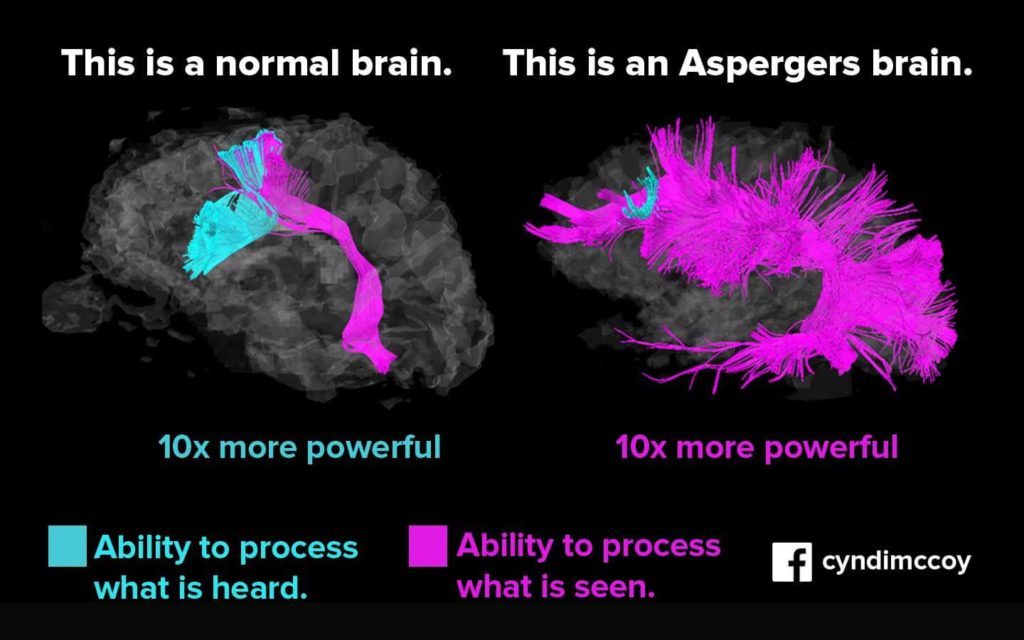SHARES
Hans Asperger, whom the condition Asperger’s Syndrome is named after, once said: “for success in science or art a dash of autism is essential.”
I believe it’s one of those quotes worth repeating.
Aside from the text in medical books, I for one would not have been able to understand Asperger’s as deeply if not for the Ted talk I watched recently. But that is for another day.
Asperger’s may affect as many as 1 in 250 children. Most times, Asperger’s Syndrome (AS) is misunderstood. This is because AS is pegged as part of the autism spectrum, but it’s not always consistent with autism stereotypes.
For example, people with Asperger’s, or fondly known as Aspies, don’t have trouble with verbal communication. In fact, many have been gifted with extraordinary verbal skills and some do well in school. Furthermore many have above-average IQs – think Robin Williams or Einstein.
What is Asperger’s ?
While it’s difficult to explain the entirety of Asperger’s in a sentence, the Merriam-Webster dictionary has made a good, if not very readable, attempt at an Asperger’s Syndrome definition.
“An autism spectrum disorder that is characterised by impaired social interaction, by repetitive patterns of behavior and restricted interests, by normal language and cognitive development but poor conversational skills and difficulty with nonverbal communication, and often by above average performance in a narrow field against a general background of impaired functioning.”
A good start, but let’s break Asperger’s down into its symptoms and look at them in more detail.
Clumsiness
Often Aspies have a poor sense of coordination. It’s not clear why people with Asperger’s tend to have poor motor skills. However one theory is Aspies’ sense of where their bodies are in space and how they’re moving, are poorly developed.
This can result in an odd gait and jerky movements. And in children, trouble with sports or group games.
Lack of Interest in Social Interaction
Social issues seem to be the common denominator when it comes to the autism spectrum. People with severe autism often have no desire to socialize. On the contrary, people with AS usually desire relationships even though they struggle with social skills.
They often feel empathy and care about the people in their lives the same way a typical normal people do, but may find it difficult to show these feelings.
Repetitive Movements
These repetitive motions can begin as early as 2 years old. These signs are one of the best predictors for whether or not a child with concerning symptoms will go on to an autism or Asperger’s diagnosis.
A popular theory is that these motions are comforting for children on the autism spectrum, but new research indicates that repetitive motions and focused interests may activate their reward systems in ways that social interaction does not.
Specific or Unusual Interests
Consuming interests are common in children, but it’s unusual for one interest to entirely dominate a child’s attention and time. In adults, who usually have a variety of interests, this symptom can be even more obvious.
For example, an interest that is usually general like stamp collecting, cars, or dolls, may be very specific in a child or adult. In contrast, for Aspies – an interest in collecting blue cars, a fascination with remembering which number plate he or she has seen on passing cars, or an interest in collecting dolls with short, blonde hair.
What About Treatment ?
Most treatment plans for Asperger’s involve working with a therapist to identify areas where the symptoms of AS are interfering with an individual’s ability to function and be happy. Based on that, the therapist focus to improve those areas.
Speech therapy for example, isn’t just for children who have delayed speech or pronunciation difficulties. A therapist can help people with AS use the pitch fluctuations of everyday speech to avoid monotonous or flat-sounding speech patterns. Therapy can also help with understanding nonverbal cues, like facial expressions, hand motions, and body language.
On the other hand, Cognitive Behavioural Therapy (CBT) can help with emotional outbursts and obsessive thoughts and interests. CBT is also a common depression treatment for treating depression in people with AS. Particularly since some research indicates that people with Asperger’s are at higher risk for depression.
Although, there are no medications approved for the treatment of autism or Asperger’s, but sometimes medication is used to treat conditions that can occur simultaneously with AS, like depression and anxiety.
Service dogs are also useful to help people with Asperger’s manage their emotion.
You can search, find, call, send enquiry or request for appointment with a GP/ Family Doctor on GetDoc:
Find a GP/Family Doctor in Malaysia, on GetDoc
Find a GP/Family Doctor in Singapore, on GetDoc
Reference:
https://www.depressionalliance.org/aspergers-in-adults/
https://www.additudemag.com/autism-spectrum-disorder-in-adults/
https://www.ninds.nih.gov/Disorders/All-Disorders/Asperger-Syndrome-Information-Page
by Yashwini Ravindranath
Born & raised in Malaysia, Yashwini earned her M.D. studying in Moscow's Russian National Research Medical University. With an affiliation towards research, all things coffee and the startup ecosystem, she now contributes articles to GetDocSays View all articles by Yashwini Ravindranath.






